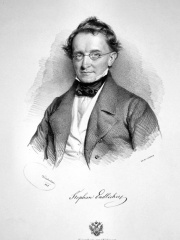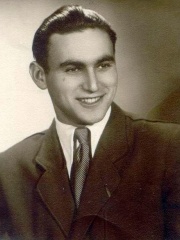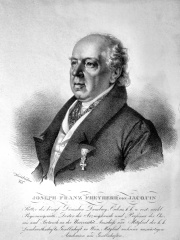



The Most Famous
BIOLOGISTS from Slovakia
This page contains a list of the greatest Slovak Biologists. The pantheon dataset contains 1,097 Biologists, 4 of which were born in Slovakia. This makes Slovakia the birth place of the 31st most number of Biologists behind Ireland, and Israel.
Top 4
The following people are considered by Pantheon to be the most legendary Slovak Biologists of all time. This list of famous Slovak Biologists is sorted by HPI (Historical Popularity Index), a metric that aggregates information on a biography's online popularity.

1. Stephan Endlicher (1804 - 1849)
With an HPI of 66.40, Stephan Endlicher is the most famous Slovak Biologist. His biography has been translated into 29 different languages on wikipedia.
Stephan Friedrich Ladislaus Endlicher, also known as Endlicher István László (24 June 1804 – 28 March 1849), was an Austrian botanist, numismatist and Sinologist. He was a director of the Botanical Garden of Vienna. The standard author abbreviation Endl. is used to indicate this person as the author when citing a botanical name.

2. Rudolf Vrba (1924 - 2006)
With an HPI of 65.50, Rudolf Vrba is the 2nd most famous Slovak Biologist. His biography has been translated into 30 different languages.
Rudolf Vrba (born Walter Rosenberg; 11 September 1924 – 27 March 2006) was a Slovak-Jewish biochemist who, as a teenager in 1942, was deported to the Auschwitz concentration camp in German-occupied Poland. He escaped from the camp in April 1944, at the height of the Holocaust, and co-wrote the Vrba-Wetzler report, a detailed report about the mass murder taking place there. The report, distributed by George Mantello in Switzerland, is credited with having halted the mass deportation of Hungary's Jews to Auschwitz in July 1944, saving more than 200,000 lives. After the war, Vrba trained as a biochemist, working mostly in England and Canada. Vrba and his fellow escapee Alfréd Wetzler fled Auschwitz three weeks after German forces invaded Hungary and shortly before the SS began mass deportations of Hungary's Jewish population to the camp. The information the men dictated to Jewish officials when they arrived in Slovakia on 24 April 1944, which included that new arrivals in Auschwitz were being gassed and not "resettled" as the Germans maintained, became known as the Vrba–Wetzler report. When the War Refugee Board published it with considerable delay in November 1944, the New York Herald Tribune described it as "the most shocking document ever issued by a United States government agency". While it confirmed material in earlier reports from Polish and other escapees, the historian Miroslav Kárný wrote that it was unique in its "unflinching detail". There was a delay of several weeks before the report was distributed widely enough to gain the attention of governments. Mass transports of Hungary's Jews to Auschwitz began on 15 May 1944 at a rate of 12,000 people a day. Most went straight to the gas chambers. Vrba argued until the end of his life that the deportees might have refused to board the trains, or at least that their panic would have disrupted the transports, had the report been distributed sooner and more widely. From late June and into July 1944, material from the Vrba–Wetzler report appeared in newspapers and radio broadcasts in the United States and Europe, particularly in Switzerland, prompting world leaders to appeal to Hungarian regent Miklós Horthy to halt the deportations. On 2 July, American and British forces bombed Budapest, and on 6 July, in an effort to exert his sovereignty, Horthy ordered that the deportations should end. By then, over 434,000 Jews had been deported in 147 trains—almost the entire Jewish population of the Hungarian countryside—but another 200,000 in Budapest were saved.

3. Joseph Franz von Jacquin (1766 - 1839)
With an HPI of 60.92, Joseph Franz von Jacquin is the 3rd most famous Slovak Biologist. His biography has been translated into 20 different languages.
Joseph Franz Freiherr von Jacquin or Baron Joseph von Jacquin (7 February 1766, in Schemnitz – 26 October 1839, in Vienna) was an Austrian scientist who studied medicine, chemistry, zoology and botany. The standard author abbreviation J.Jacq. is used to indicate this person as the author when citing a botanical name. He was the son of the botanist Nikolaus von Jacquin.

4. Günther Beck von Mannagetta und Lerchenau (1856 - 1931)
With an HPI of 59.64, Günther Beck von Mannagetta und Lerchenau is the 4th most famous Slovak Biologist. His biography has been translated into 17 different languages.
Günther Ritter Beck von Mannagetta und Lerchenau[a] (25 August 1856 in Pressburg, modern Bratislava – 23 June 1931 in Prague) was an Austrian botanist.
People
Pantheon has 4 people classified as Slovak biologists born between 1766 and 1924. Of these 4, none of them are still alive today. The most famous deceased Slovak biologists include Stephan Endlicher, Rudolf Vrba, and Joseph Franz von Jacquin.
Deceased Slovak Biologists
Go to all RankingsStephan Endlicher
1804 - 1849
HPI: 66.40
Rudolf Vrba
1924 - 2006
HPI: 65.50
Joseph Franz von Jacquin
1766 - 1839
HPI: 60.92
Günther Beck von Mannagetta und Lerchenau
1856 - 1931
HPI: 59.64
Overlapping Lives
Which Biologists were alive at the same time? This visualization shows the lifespans of the 4 most globally memorable Biologists since 1700.

